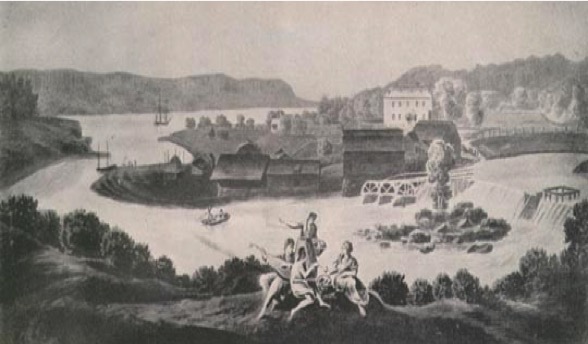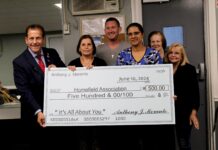
The earliest known sketch of Philipse Manor Hall
By Mary Hoar, City of Yonkers Historian, President Emerita Yonkers Historical Society, Revolutionary Yonkers 250 Chair, recipient of the 2004 Key to History, Member of the Yonkers Landmarks Preservation Board, and President Untermyer Performing Arts Council
Monday, May 27th
May 27, 1862: John Kendrick Bangs was born in Yonkers; this author, satirist and humorist ran unsuccessfully for Mayor of Yonkers against John Peene in 1894. After losing the election, he wrote “Three Weeks in Politics,” a thinly disguised recounting of his run for Mayor.
May 27, 1941: Campbell Hat Company, Stanley Avenue, received a $67,000 contract from the Army Quartermaster’s depot in Philadelphia to manufacture 24,000 olive drab hats. The company’s fifth defense contract; its contracts totaled just under $350,000.
May 27, 1942: Cameo Curtains on John Street was awarded a large government contract to manufacture mosquito bars for the Army. The company hired 100 more employees and worked in two shifts for the remainder of the year to fulfill this contract.
Tuesday, May 28th
May 28, 1945: A scroll honoring the 32 Yonkers Boy Scouts who died in the service of their country was updated and hung in Scout Headquarters.
May 28, 1965: Dr. Martin Luther King addressed the Negro American Labor Council at their fifth annual convention held at the Westchester Town House on Tuckahoe Road, now Royal Regency Hotel. The convention, whose theme was “Economic Freedom and Security for the Black and White Poor,” was attended by labor leaders from all over the country.
May 28, 1965: On his way to the airport, Dr. Martin Luther King, Jr., stopped at Temple Emanu-El on Rumsey Road; he spent
forty-five minutes viewing their display of African themed painting and sculpture at the Temple’s annual art exhibit.
May 29th
May 29, 1779: Sir Henry Clinton made his headquarters in the Manor House to plan attacks on Verplank and Stony Point
May 29, 1932: More than 1,500 people attended an unveiling ceremony at Frederick Stilwell Park in southeast Yonkers. The tablet, commemorating the men of McLean Heights and Wakefield Park who served in the various wars, stood six-feet high and was located near the McLean Avenue entrance to the park.
May 29, 1937: Police Chief Edward Quirk announced Yonkers residents could wear shorts on city streets any time they wanted during Memorial Day weekend or at any other time! The Court of Appeals had killed Alderman William Slater’s ordinance banning them.
Thursday, May 30th
May 30, 1872: Thomas Ludlow, leader of opposition to incorporation of Yonkers as a city, presented a protest petition to NYS Governor Hoffman. According to Ludlow, most people who lived outside the boundaries of the Village of Yonkers were opposed to becoming a city. That section, about 16 square miles, was chiefly farmland with few buildings.
They resented this being considered without consultation, stating this was “against the spirit of our institutions that any portion of the people of this State shall be subjected to an entire change in the form of their municipal government without some authorized expression of the will of the people to be affected thereby on that subject.” Richard Lawrence, H. Schefflen, John Taylor, Thomas Radford, Thomas Knowlton, B. Weeks, G. Rollins and J. Henry Williams signed Ludlow’s petition. Others expressing displeasure were well-known residents Shonnard and Saunders, with the latter claiming the incorporation was the scheme of just three men and did not reflect the opinion of the majority of Yonkers people.
Ludlow and Shonnard also had led opposition to incorporation of the Village of Yonkers in 1854; then the men proposing the status change left out Ludlow’s property to the south and Shonnard’s property to the north of the incorporated village.
Friday, May 31st
May 31, 1943: For the first time, the Yonkers Memorial Day Parade took place without a Civil War Veteran. Ninety-seven-year-old Charles Frazee of Douglas Avenue, Yonkers only remaining GAR veteran, had a minor illness, so missed being Honorary Grand Marshall and riding at the front of the parade.
Speakers at the post parade program presented a variety of messages. Lieutenant Iva Lindstrom, US Army Nurse Corp, told the crowd about the urgent need for nurses for wounded or sick servicemen overseas. YMCA General Secretary Horace Shepherd stated all were there “to honor our fellow Americans who died in the interest of human liberty, freedom and democracy.” Mayor Barnes called on everyone to “preserve our way of life,” continuing, “To those looking down from above, we can hold our heads high and not be ashamed of what we are doing for those in the service.”
Saturday, June 1st
June 1, 1872: New York State Governor John Hoffman signed the charter establishing Yonkers as a city.
June 1, 1943: The Yonkers National Bank and Trust Company’s short-term loan of half a million dollars enabled Yonkers to meet the $929,500 bond maturities falling due and prevent what could have been Yonkers’ most drastic financial crisis in history!
Sunday, June 2nd
June 2, 1914: His yacht rail almost awash as it heeled to a fresh northwest breeze, Alexander Smith Cochran’s bronze sloop-yacht Vanitie crossed the finish line first off Parsonage Point, the initial race in a series of 35 trials for the America’s Cup defense yachts. It took place on a thirty-mile course on Long Island Sound and was managed by the New York Yacht Club.
June 2, 1945: Captain Reynolds Hayden, USN, commander of the Naval Hospital at Pearl Harbor when Japan attacked, and a resident of the Hampshire House on Bronx River Road, addressed the first public meeting on Red Cross first aid at a meeting at the Knights of Columbus on South Broadway. Also speaking were Health Commissioner Eugene McGillian and Justin McCarthy, new Yonkers Chapter Chairman.
Questions or comments on this column? Email YonkersHistory1646@gmail.com.
For information on the Yonkers Historical Society, Sherwood House and upcoming events, please visit our website www.yonkershistoricalsociety.org, call 914-961-8940 or email info@yonkershistoricalsociety.org





